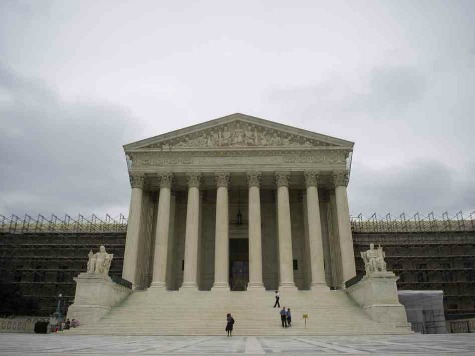
On Monday, the Supreme Court granted review in what could be the biggest religious liberty victory for Americans of faith in decades. The case is Town of Greece v. Galloway.
The town of Greece, New York, begins its town board meetings with an opening prayer. It allows any citizen to sign up to offer the prayer on a first-come, first-served basis. Any town citizen may do so regardless of their faith, and in the past both Wiccans and even atheists were welcomed to offer prayers if they wished.
Yet militant secularists filed suit, claiming these public invocations violate the Establishment Clause of the First Amendment. Although the Supreme Court upheld invocations at the outset of meetings of policymaking governmental bodies–a practice called “legislative prayer”–the plaintiffs followed a recent trend of saying that because some prayers are “sectarian”–that is, have some Christian content–that the practice is unconstitutional. The Alliance Defending Freedom (ADF) defended the Town of Greece, and the U.S. District Court for the Western District of New York sided with the town.
Nonetheless, the U.S. Court of Appeals for the Second Circuit reversed. In a shockingly broad opinion of unprecedented reach, the appeals court held that courts must look at the “totality of the circumstances” to determine if the Establishment Clause has been violated by prayer. The court said that the fact that a majority of prayers included Christian content, such as referencing Jesus, the Holy Spirit, or a holiday like Christmas, made the prayers unconstitutional.
But beyond that, the court held that even if such content was avoided, the fact that a majority of the volunteer prayer-givers were Christian violated the Establishment Clause, despite the fact that the vast majority of town residents are Christians and so a proportional number of Christian volunteers was virtually unavoidable. The court even said that the fact that many prayers-givers said “we pray” instead of “I pray” during their prayers was unconstitutional, which is astounding given how often people praying in a group will say “we.”
ADF then asked Thomas Hungar of Gibson Dunn & Crutcher, one of the most accomplished Supreme Court litigators in the nation–to become lead counsel on the case and join with ADF in asking the Supreme Court for review by filing a petition for certiorari. Today the Supreme Court granted that petition.
ADF’s David Cortman says:
Americans today should be as free as the Founders were to pray. The Founders prayed while drafting our Constitution’s Bill of Rights, and the Supreme Court has ruled that public prayer is part of the “history and tradition of this country.” American continues this cherished practice.
The last time Americans had a victory for religious liberty purely on Establishment Clause grounds was 2005, when the Supreme Court upheld a Texas Ten Commandments display in Van Orden v. Perry. But that was a fractured 5-4 decision with no majority opinion, so no enduring rule of law was established as precedent in that case.
It’s possible one must go back as far as 1983 to the Supreme Court’s first vindication of legislative prayer in Marsh v. Chambers to find a majority win. The few wins over the past 30 years for people of faith have been due to free speech or the free exercise of religion–rather than the Establishment Clause–or because the case was dismissed on procedural grounds.
Ever since Justice Samuel Alito took the seat of Justice Sandra Day O’Connor, scholars have wondered if the Court had become friendlier to people of faith, especially Christians. Now they will find out.
Breitbart News legal columnist Ken Klukowski, a senior fellow for religious liberty at the Family Research Council, filed a brief on behalf of Members of Congress in Town of Greece v. Galloway.

COMMENTS
Please let us know if you're having issues with commenting.